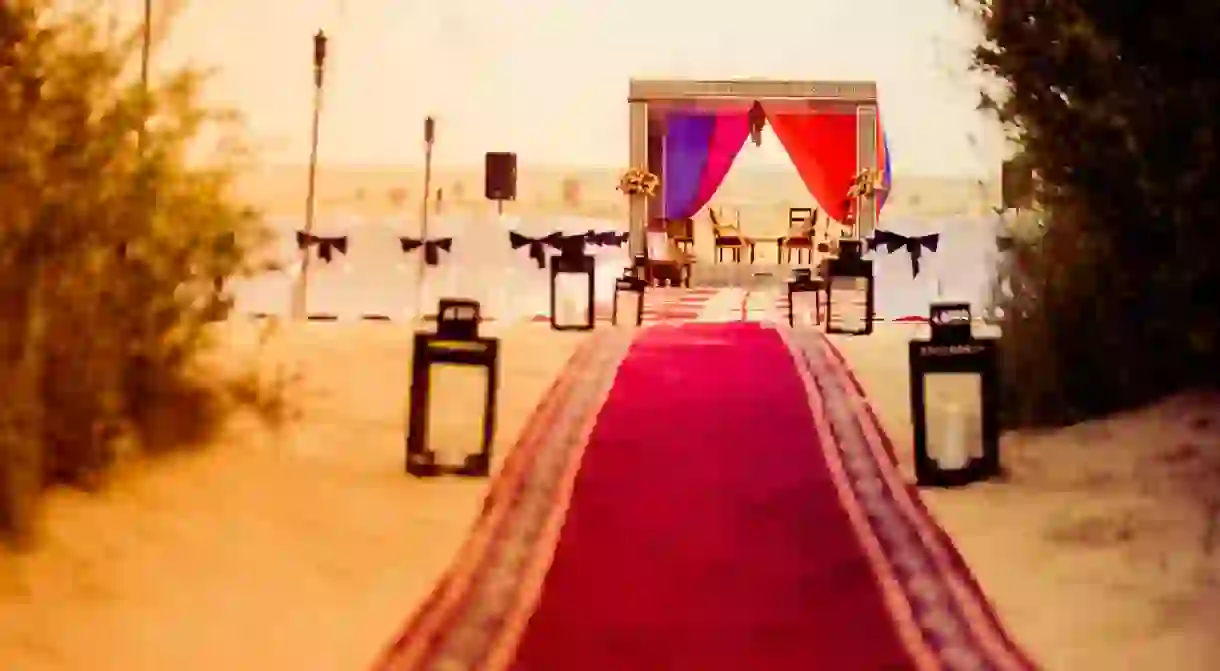What to Expect at a Palestinian Wedding

Chat to any Palestinian for long enough, and chances are they will invite you to their brother, daughter, nephew or cousin’s wedding, most likely a large family and week-long affair comprised of multi-part ceremonies and rituals.
As a central part of Palestinian culture and family life, locals love including foreigners and wandering tourists into the wedding celebrations so that they can bear witness to the multitude of age-old customs that take place inside the tight-knit communities and large families. Palestinian weddings are an extra special occasion to see the culture at its most vibrant – so grab your dancing shoes, and get ready for a few days of singing, eating, and being merry (without the champagne, of course). Palestine is home to a variety of religions, so wedding traditions vary according to religious custom, region, village and even family.
Prepare to get stuffed
The day before the haflat al-zafaf – the official reception-type wedding party – the groom’s family usually hosts a wedding lunch. According to tradition, the groom-to-be goes out in the morning to slaughter a sheep, which is then prepared for a feast by the family. Although the tradition of slaughtering is less common these days, everyone still pitches in to help with the preparations. Female friends and family gather in the kitchen to prepare delicious home-cooked traditional dishes, such as safiha, kubbeh, and mansaf, a Levantine speciality of lamb cooked in yoghurt, for guests who arrive to greet and congratulate the bride, groom and their family.
At the wedding party itself, however, guests will not find any food apart from sweets, but the chances are that you’ll still be full from the feast the day before.

Everyone’s invited
Traditional rural families may hold the wedding party in a public square in the village, or in their own homes or land – if they are big enough to accommodate the hundreds of guests. Among refugees living in long-established camps in Palestine, it is also not uncommon for wedding parties to take place on the street. Refugee communities are especially tight-knit, and holding the wedding party in this way symbolises the closeness and inclusiveness of the camp community.

Ladies to the left, fellas to the right
If you’re a woman looking to meet the man of your dreams, or vice versa, at a wedding, you might be disappointed when you find out that Palestinian wedding parties are gender segregated. The men have their celebration with the groom, while the bride and the female guests have a separate party. However, some more liberal families will allow mixing towards the end of the festivities, when the male guests are allowed to enter the women’s side.
https://www.instagram.com/p/Bav57_9BNEx/?hl=en&tagged=palestinianwedding
Get your glad rags on
Wedding celebrations are cause for the whole community to get dressed to the nines, and you will usually see a variety of clothing being worn at the party, from traditional, embroidered gowns with embellished headdresses to grandiose ball gowns and the latest fashions. Due to the gender-segregated nature of the celebrations, you may see more daring and revealing outfits than you’d see on any other day. It is also true that weddings are an opportunity for mothers to scout out potential brides for their sons, so single females looking to up their chances of being the next one down the aisle go all out, looking their best in order to make an impression on the eagers mothers in the room. The men, too, pull out all the stops, donning their best suits or even tuxedos. Most Palestinian brides these days follow in the Western tradition of wearing a white gown, but some still go for the traditional, vibrantly coloured and embellished dresses.
Say bye to the booze
If you’re used to relying on the free champagne as a social lubricant at weddings, Palestinian weddings might be a shock to the system, as the Muslim ones, at least, are strictly alcohol-free zones. You can still get a buzz, however, from the gallons of fizzy drinks on offer throughout the night. The absence of booze makes no impact on the dancing, which is perhaps livelier, and more skilful, than it would be at any Western celebration.

Be prepared to boogie
The main feature of any wedding party, however, is the dancing, so expect to be on your feet for a good few hours to honour the happy couple. Everyone will be on the dance floor – including children, babies and even grandmas. You will notice that Arab dancing incorporates a lot of hips and wrists movement, so go with the flow and you will get the hang of it – hopefully not to the amusement of your Arab companions.
Wedding guests at most celebrations also perform the dabkeh, the traditional Palestinian folk dance, which is both a joy to watch and to dance. Another unwritten rule of Palestinian weddings is that the groom’s mother will be dancing the whole night through, to symbolise her happiness at her son getting married. The stamina and energy of the mother of the groom is no mean feat!
https://www.youtube.com/watch?v=6JccoxBl8sY
Expect a little hearing loss
Arabs like to play their music loud, whether blasting out of car windows while making their way to the celebration or in the venue itself. On top of the continuous blaring of songs, chants, shouting, drumming, and the zaghareet – the ululating or high-pitched lu-lu-lu-leesh sound made by the women – don’t expect to have your full hearing for a few days following the wedding. It will be totally worth it!
https://www.instagram.com/p/BZWSMPxH4L5/?hl=en&tagged=palestinianwedding













